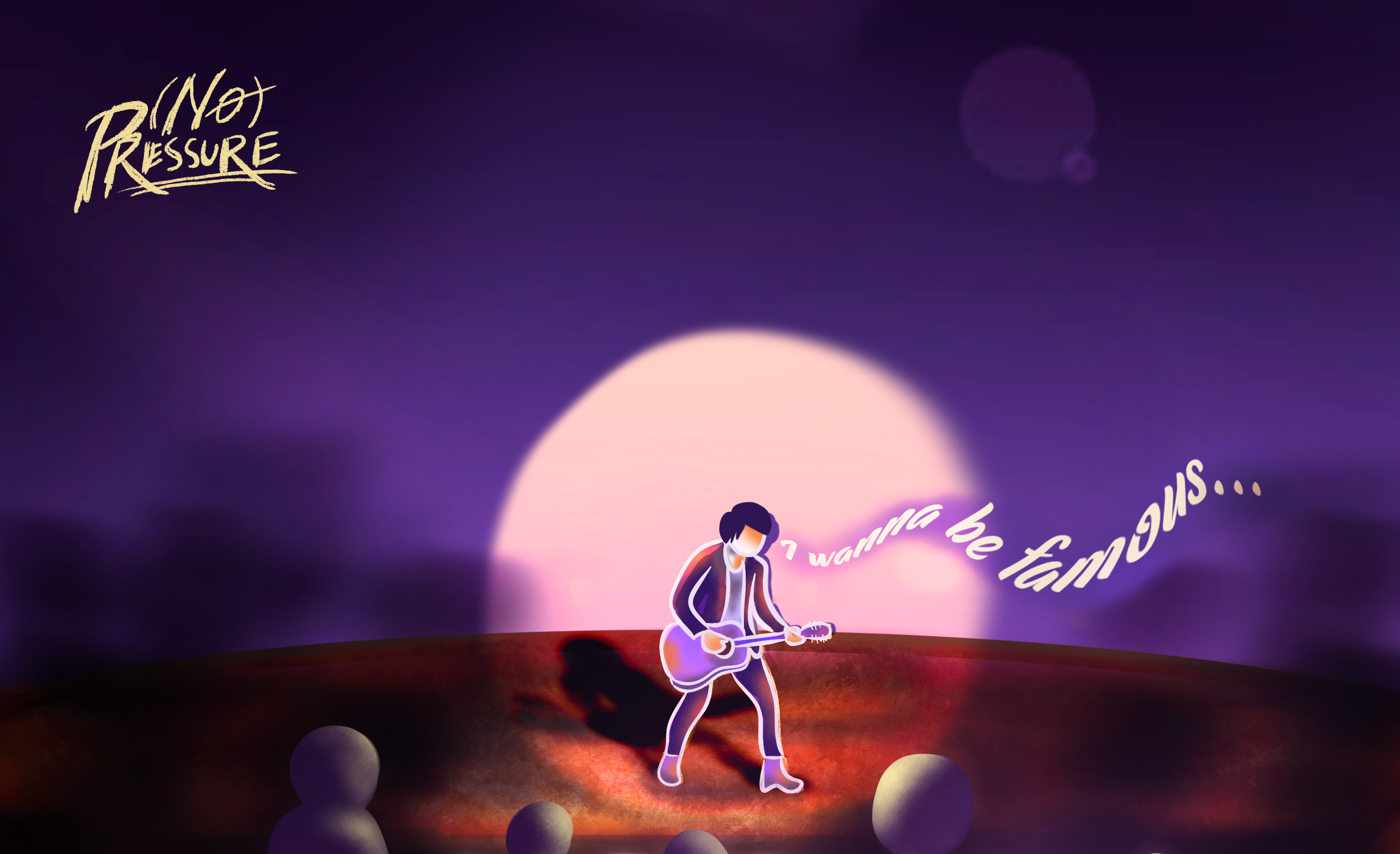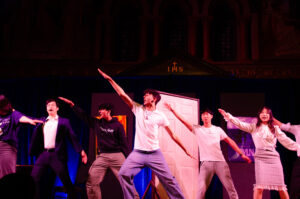History was made at Gaston Hall last week as Georgetown University’s first-ever Asian American musical took to the stage. For two and a half hours, the audience was transported to Potomac University, where they followed a group of Asian students through a semester of friendship, love, music, and late nights at Lou 2’s Twilight Tea. The musical explores multiple dimensions of the Asian American experience through five distinct story arcs that cross over into hilarious and touching moments.
(no) pressure: an asian american musical is a momentous step toward better diversity and inclusion for Asian American and Pacific Islander (AAPI) artists in theater. The production opened with a short documentary showing the six-month creation process of the entirely student-written and student-led production. The magnitude of this undertaking cannot be overstated, as it typically takes years for a musical to materialize from script to stage.
“[Executive Producer] Aidan [Ng] pitched this idea of writing and producing an entirely original musical in a year, which at the time I thought was absolutely crazy. A part of me still thinks so,” Ed Shen (MSB ’23), producer and co-president of Georgetown’s Asian American Student Association (AASA) said. “But I think it was just the right kind of thing that I wanted us to have.”
Ng (SFS ’25) was motivated to increase Asian representation in Georgetown theater spaces that have historically been—and continue to be—predominantly white. Much of the cast had never acted before: “They’ve always felt the urge, felt the itch, but they just never had the place to do it,” Ng said. “Because if you’re an outsider, it’s jarring, it’s scary.”
By featuring five leading characters, Ng explained, (no) pressure seeks to include as many perspectives of the Asian diaspora as possible. “We encourage the leads to take the lines that they have and make them their own, because obviously our scriptwriting team can’t encompass every single part of the Asian American identity,” Ng said.
Indeed, authenticity is the show’s greatest strength. Each of the leads—Ted (Wyatt Nako, CAS ’26), Arlene (Nirvana Khan, SFS ’24), Genji (Jesse Lin, SFS ’23), Cynthia (Samhita Vellala, CAS ’25), and Lexi (Alyx Lee, CAS ’25)—feel unique and personal. Although lacking the polish of a professional production, the show is genuine and energizing, and an absolute joy to watch.
If the roaring laughter in Gaston was any indication, (no) pressure’s comedic moments were expertly executed. One highlight was the maniacal hilarity of Griffin Seo (Harry Tang, MSB ’25), the three-time Sexiest Man Alive, multiple-Grammy winner, and Potomac alumnus. His self-importance and open disdain for the students manifests through his dramatic bouts of rap and song accompanied by dancing goons.
Carl (Jean-Paul Nguyen, CAS ’24), a student DJ who performed a 5-hour set for the Potomac Day darties, also shined. Two scenes between Carl and Genji showcased the performers’ natural comedic chemistry. While Genji narrated the woes of his relationship with Arlene, Carl delivered humorous advice that was surprisingly sage, drawing laughter from the audience. (no) pressure skillfully draws from the shared experience of life on the Hilltop to take advantage of students’ inside jokes.
However, it was not all laughs, and the show struggled to find its footing in the first act. The dialogue felt unnatural at times, which was most apparent in introspective scenes where monotonous line delivery made intimate moments feel intrusive. During a congenial first date at a high-brow restaurant, Arlene’s sudden question of “Why me?” comes across as more pushy than skeptical, and Genji’s drawn-out emotional response felt out of the blue. The stilted dialogue interfered with the audience’s understanding of relationships, causing many potentially touching moments to fall flat.
While the second act picks up the pace with multiple tensions coming to a head, it continues to suffer from character relationships that feel underdeveloped with choppy, cliched dialogue. Arlene and Genji’s split was an amalgamation of almost every single breakup trope—“It’s not you, it’s me,” “I need space,” “we’re looking for different things.”
Lexi’s tension with her homophobic roommate Vivienne (Audrey Sun, CAS ’25) was boiled down to a Disney Channel-esque confrontation, culminating in the protagonist “rising above it all.” Although predictable, the actors’ emphatic line delivery and the audience’s zealous reactions made the scenes feel like verbal WWE matches, and admittedly fun to watch.
What the dialogue lacks in nuance, the songs make up for in spades. The show’s ballads offer intimate deep-dives into experiences that many Asian Americans can relate to. Cynthia and Lexi’s duet, “Belonging,” highlights Vellala and Lee’s incredible vocal abilities through powerful riffs and harmonies. Both characters struggle to find a sense of “belonging”: Lexi as a new student to Potomac, and Cynthia as a third-generation Asian American who has been disconnected from her culture. Through the song, they learn to build themselves up without external validation.
The most impactful moment of the act, and of the whole show, is undoubtedly when Ted’s parents call to tell him his dad left his job. While Ted’s earlier solo, “Famous,” is the manifestation of his dreams to make it in the music industry, “Is Anybody Out There?” is about the reality of financial struggles and a responsibility many Asian Americans feel to secure a stable future. The singing is layered, both literally and figuratively; Ted belts feelings from the front of the stage, while his parents sit behind him singing backup vocals. Ted acknowledges the financial burden of his parents sending him to college in this intergenerational exchange, and expresses his persistent desire to support them, demonstrating a core tension between personal ambition and familial responsibilities. Nako’s rousing yet grounded performance communicates the emotional complexity of intertwined gratitude and guilt.
Stories like Ted’s make (no) pressure such a promising development for the AAPI community in theater, and one that creates more opportunities for AAPI performers to showcase their lived experiences on stage. It created a space for dozens of Asian creatives at Georgetown to take the leap into producing, directing, and performing.
“What I hope comes out of this show is, first of all, that it’s a good show and that people, you know, enjoy it,” Shen said. “From a broader lens, I hope this shows the community that there is Asian talent for these kinds of productions, and that you can afford to dream big and be crazy.”





